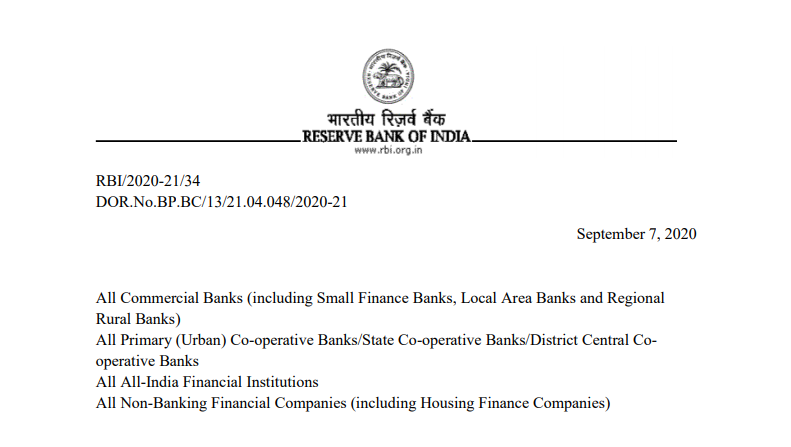Resolution Framework for COVID-19-related Stress – Financial Parameters: RBI
All Commercial Banks (including Small Finance Banks,
Local Area Banks and Regional Rural Banks)
All Primary (Urban) Co-operative Banks/State Co-operative Banks/District Central Cooperative Banks
All All-India Financial Institutions
All Non-Banking Financial Companies (including Housing Finance Companies)
Madam / Dear Sir,
Resolution Framework for COVID-19-related Stress – Financial Parameters
Please refer to Paragraphs 23 and 24 of the Annex to the circular DOR.No.BP.BC/3/21.04.048/2020-21 dated August 6, 2020 (“Resolution Framework”) which envisages the constitution of an Expert Committee by the Reserve Bank to make recommendations on the required financial parameters with sector-specific benchmark ranges for such parameters to be factored in the resolution plans in respect of borrowers eligible under Part B of the Annex to the Resolution Framework.
2. The Reserve Bank had accordingly set up an Expert Committee with Shri K. V. Kamath as the Chairperson, as announced in the press release dated August 7, 2020. The Expert Committee has since submitted its recommendations to the Reserve Bank on September 4, 2020, which have been broadly accepted by the Reserve Bank.
3. Accordingly, all lending institutions shall mandatorily consider the following key ratios while finalizing the resolution plans in respect of eligible borrowers under Part B of the Annex to the Resolution Framework:
| Key Ratio | Definition |
| Total Outside Liabilities / Adjusted Tangible Net Worth (TOL/ATNW) | Addition of long-term debt, short term debt, current liabilities, and provisions along with deferred tax liability divided by the tangible net worth net of the investments and loans in the group and outside entities |
| Total Debt / EBITDA | Addition of short term and long-term debt divided by the addition of profit before tax, interest, and finance charges along with depreciation and amortization. |
| Current Ratio | Current assets divided by current liabilities |
| Debt Service Coverage Ratio (DSCR) | For the relevant year addition of net cash accruals along with interest and finance charges divided by the addition of the current portion of long term debt with interest and finance charges. |
| Average Debt Service Coverage Ratio (ADSCR) | Over the period of the loan addition of net cash accruals along with interest and finance charges divided by the addition of the current portion of long term debt with interest and finance charges. |
4. The sector-specific thresholds (ceilings or floors, as the case may be) for each of the above key ratios that should be considered by the lending institutions in the resolution assumptions with respect to an eligible borrower are given in the Annex. In respect of those sectors where the sector-specific thresholds have not been specified, lending institutions shall make their own internal assessments regarding TOL/ATNW and Total Debt/EBITDA. However, the current ratio and DSCR in all cases shall be 1.0 and above, and ADSCR shall be 1.2 and above.
5. Lending institutions are free to consider other financial parameters as well while finalizing the resolution assumptions in respect of eligible borrowers apart from the above mandatory key ratios and the sector-specific thresholds that have been prescribed. The above requirements are applicable even in cases when there is only one lending institution with exposure to an eligible borrower.
6. The ratios prescribed in paragraph 4 are intended as floors or ceilings, as the case may be, but the resolution plans shall take into account the pre-COVID-19 operating and financial performance of the borrower and the impact of Covid-19 on its operating and financial performance at the time of finalizing the resolution plan, to assess the cash flows in subsequent years, while stipulating appropriate ratios in each case.
7. Given the differential impact of the pandemic on various sectors/entities, the lending institutions may, at their discretion, adopt a graded approach depending on the severity of the impact on the borrowers, while preparing or implementing the resolution plan. Such a graded approach may also entail classification of the impact on the borrowers into mild, moderate, and severe, as recommended by the Committee.
8. Lending institutions are expected to ensure compliance with TOL/ATNW agreed as per the resolution plan at the time of implementation itself. Nevertheless, in all cases, this ratio shall have to be maintained as per the resolution plan by March 31, 2022, and on an ongoing basis thereafter. However, wherever the resolution plan envisages equity infusion, the same may be suitably phased-in over this period. All other key ratios shall have to be maintained as per the resolution plan by March 31, 2022, and on an ongoing basis thereafter.
9. The compliance in regard to meeting the agreed ratios must be monitored as financial covenants on an ongoing basis and during subsequent credit reviews. Any such breach not rectified within a reasonable period, in terms of the loan contract, will be considered as financial difficulty.
Other Clarifications – Applicability of ICA and Escrow account
10. The various requirements of the Resolution Framework, especially the mandatory requirement of ICA, wherever applicable, and maintenance of an escrow account after implementation of a resolution plan, shall be applicable at the borrower-account level, i.e. the legal entities to which the lending institutions have exposure to, which could include a special purpose vehicle having a legal-entity status, set up for a project.
11. It is further clarified that signing of ICA is a mandatory requirement for all lending institutions in all cases involving multiple lending institutions, where the resolution process is invoked, and the requirement of additional provisions if the ICA is not signed within 30 days of invocation, does not substitute for the mandatory nature of ICA. Compliance with this regulatory requirement shall be assessed for all lending institutions as part of the supervisory review.
Yours faithfully,
(Prakash Baliarsingh)
Chief General Manager
Read & Download the full copy in pdf:
 ConsultEase Administrator
ConsultEase Administrator
Consultant
Faridabad, India
As a Consultease Administrator, I'm responsible for the smooth administration of our portal. Reach out to me in case you need help.








